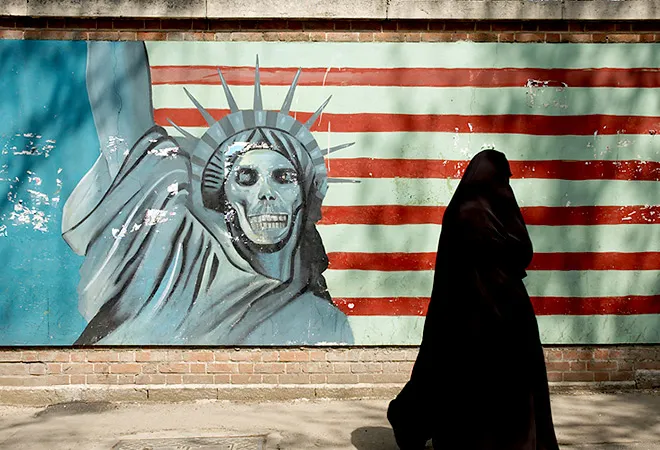-
CENTRES
Progammes & Centres
Location

Image Source: Kamyar Adl/CC BY 2.0
India’s relations with Iran can be clearly divided into two phases in the new millennium. The pre ‘Indo-US Civil Nuclear Deal’ period (up to June 2005) and the ‘post -2005 period’. Before 2005, India and Iran dealt with each other as two sovereign nations independent of their relations with any other country. India imported large quantities of crude oil from Iran, as it did not want to be solely dependent on any one source from the Gulf. Though our imports of crude were the largest from Saudi Arabia, Iran was our second largest supplier accounting for an annual bill of $12 to $14 billion at its peak. This also helped us maintain equidistance between the two rival centres of power in West Asia. We kept out of their bilateral tensions as well as their spheres of influence. While one was a Sunni Kingdom, the other was a Shia Republic, both with strong constituencies in our country. We had very good relations with both.
Our Civil Nuclear Deal with the US changed all that. The ground under us had suddenly shifted in our region. We are now clearly seen as US allies for good or bad. However, we were not seen as a Power, not even as an emerging Power.
One of our first acts after the Indo-US nuclear deal was to vote against Iran in the IAEA General Conference of September 2005. This went against all our previous votes and ended up supporting a resolution to send the Iran dossier to the UNSC for failure to comply with the IAEA inspections regime of its nuclear facilities. That was the beginning of the rift.
Soon after, India started soft–pedaling on the Iran-Pakistan-India (IPI) oil pipeline. That pipeline hardly had any prospect of materialising, as it was to traverse much of its route through a virulent anti-India, terrorist infested territory in Pakistan. But that did not prevent our leaders from seriously pursuing (at least for a few years, under American persuasion) another equally doomed Turkmenistan-Pakistan-India (TAPI) gas pipeline deal. The idea was to prevent Indian market to Iran and we succumbed to that, even though Pakistan, which was much more dependent on the US for its survival, held on to that pipeline for much longer, till it found no one to foot the bill for its side of the pipeline construction.
Subsequently, as the Obama Administration tightened the sanctions on Iran in the fall of 2011, we gradually reduced our imports of Iranian oil, cutting it to less than $4billion per year by around 2014. Throughout this period, the Americans told us that Saudi Arabia was ready to pump out the extra oil to meet our needs. Wisely enough, we increased our dependence on Iraq and Venezuela. What really hurt our relations with Iran then was our utter inability to pay for the oil imports in US Dollars. The American treasury systematically shut out all our banking options, first a German bank and then a Turkish bank till we resorted to paying Turkey in cash, which then bought gold bars and sent it to Tehran across the border. And we also started part payment in Indian rupees and part in credit to Iran’s payments to a third country.
Iranians repeatedly questioned us as to how could the US intervene in a purely bilateral trade relationship.
The problem was not merely the difficulty of payments but also the intense pressure to cut down our intake.
Relations with Iran soured further when an Iranian national was suspected of carrying out an attack with the use of a magnet bomb stuck to the car of an Israeli diplomat on February 13, 2012 in central Delhi. Israel then let loose a public campaign to force our government’s hand to bring the culprit to book, a process that had no chance of succeeding given the complications of the Iranian justice system. Our repeated demarches to Tehran to handover the suspect failed to yield any result.
It must be said, however, to the eternal credit of President Obama that despite all the pressure on him from the Republicans in the Congress, as well as the Israeli and Saudi lobbies, to bomb Iran, he never gave up his efforts for a negotiated settlement of the nuclear issue with Iran.
The Joint Comprehensive Plan of Action (JCPOA) that was signed between Iran and the P5+1 countries on January 16, 2016 was to begin a new era of peace for Iran but the much-promised prosperity is yet to come.
India nevertheless began to reap the benefits of the West’s rapprochement with Iran and soon our oil imports started to rise. Prime Minister Modi’s government renewed the stalled Chahbahar project, the much-touted India’s response to China’s presence in Gwadar. Several of our Ministers visited Tehran and made multiple promises of setting up various projects in Iran. Iran too returned the favour by granting us the Farzad B gas fields to the Oil and Natural Gas Commission led consortium for exploration after much dilly-dallying.
Now with President Donald Trump in the White House, a new phase of uncertainty has emerged in our relationship with Iran. Trump, during his campaign days, had clearly threatened to tear up the nuclear deal with Iran, calling it a ‘bad deal’. Now that he is in office, he seems to have been advised that ‘tearing up the deal’ is not such a good idea as the other signatories to the deal (UK, France, Germany, Russia and China) may not do the same. That has not prevented President Trump and his Republican allies to undo the good work of his predecessor. The Senate passed a legislation to halt the sale of Boeing and Airbus commercial planes to Iran, and then went on to renew the ‘Iran Sanctions Act’ for another 10 years.
On January 27 this year, President Trump signed an Executive Order titled ‘Protecting the Nation from Foreign Terrorist’ and placed Iran in a list of seven countries whose nationals were banned entry into the US. It did not matter to President Trump that no national of any of the listed 7 countries (Iran, Iraq, Syria, Libya Yemen, Sudan and Somalia) had entered America and killed an American in the last three decades. The one country that had sent maximum number of suicide bombers in the 9/11 terror attacks on the US soil was safely and ominously missing.
The Trump administration promptly imposed a fresh set of sanctions on Iran on February 3 this year for test-firing a ballistic missile. It was a clear message that Iran has not really entered a ‘post-sanctions era’ and that he was not going to be as ‘kind’ as President Obama.
The Modi government that renewed Indian interest in the Chabahar port sent several Ministers to Iran before Prime Minister Modi’s visit to Tehran in May 2016. That gave a significant push to our bilateral relationship as India decided to commit billions of dollars in the Chabahar Free Trade Zone -- in setting up industries ranging from aluminum smelters to urea plants. Our Shipping Minister Nitin Gadkari had declared on the occasion that our investments could go up to “over Rs. 1 lakh crore in the Chabahar FTZ.”
All that was before President Trump. Soon after President Trump was sworn in January this year, both the Foreign Secretary and the NSA were quick to meet their US counterparts, starting with key Republican Senators John McCain and John Burr. In January itself, our NSA Ajit Doval met his US counterpart Michael Flynn (who resigned within a month after, on his alleged links with the Russians). On March 26, Doval went to the US and met his new counterpart H R McMaster and the Homeland Security Chief John Kelly. He also had a meeting with the new Defence Secretary John Mattis. Most of the Trump appointees are hardcore pro-Israeli, anti-Iran Republicans. John Mattis had recently threatened Iran not to provoke the new Administration with any more missile tests, as Michael Flynn declared that Iran ‘has been put on notice’. While they have not said a word about the utterly unprovoked war of aggression of Saudi Arabia on the hapless people of Yemen, they were quick to condemn and warn Iran for strengthening its defence in an extremely hostile environment.
Surprisingly, soon after Doval’s return to Delhi, the Ministry of External Affairs (MEA) asked the concerned departments to go slow on the projects planned for the Chabahar FTZ. The MEA asked the Fertiliser Department (on March 29) to instruct the state-run Rashtriya Chemicals and Fertilisers to go slow in selecting an Iranian partner for the proposed urea plant. A similar message has been sent to the proposed $3 billion investment in the aluminum smelter plant that was to be set up by the National Aluminum Company (NALCO) in Iran.
While this decision has been taken on the possibility of Indian investment getting caught in the crossfire of US sanctions on Iran, what is striking is the inability to protect and defend our bilateral relationships from becoming hostage to the arbitrariness of American policies in our region. Certainly if Russia and China could do business with Iran, we should be able to do too.
The views expressed above belong to the author(s). ORF research and analyses now available on Telegram! Click here to access our curated content — blogs, longforms and interviews.

Anjali Birla is an Indian Civil Services Officer(Batch 2020) working in the Ministry of Railways and has done her graduation in Political Science from Delhi ...
Read More +